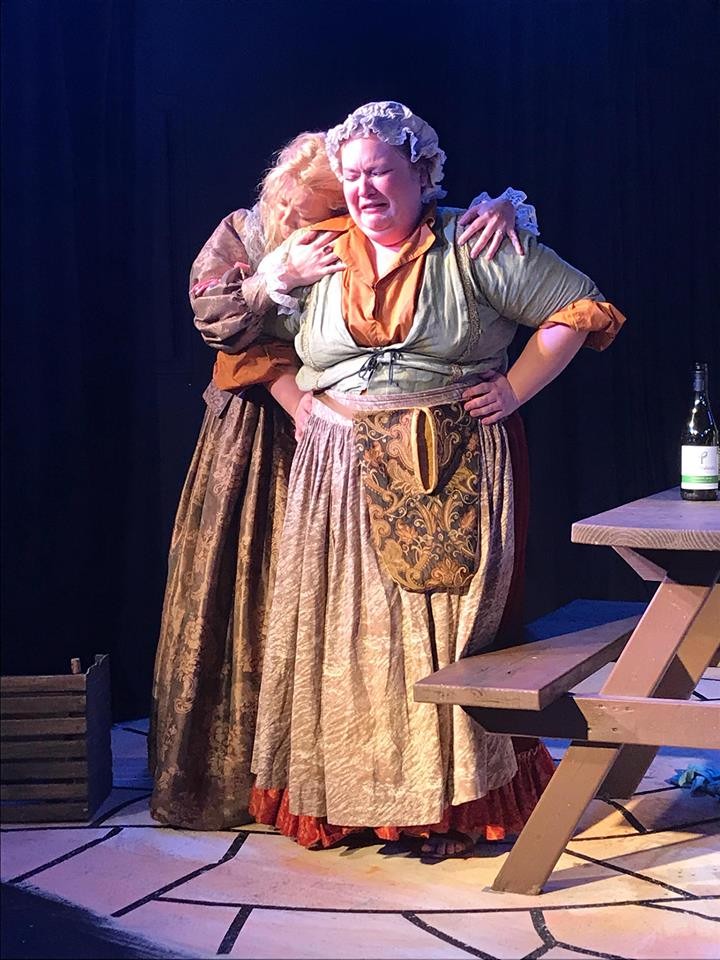
Comedy & Tragedy
I’ve often thought that Iago’s wife Emilia might be the most modern and relatable character in the wonderful world of Shakespeare. To my mind (and for reasons that won’t pass academic muster), her speeches are the only things approaching real proof that any words credited to our Elizabethan master might have been penned by another.
“It is their husbands’ faults if wives do fall,” Emilia says at the top of a gorgeous rant — one that couldn’t have been popular with menfolk in Shakespeare’s audiences. She goes on to describe a toxic environment where male promiscuity is followed by peevish jealousies and abuse. “Let husbands know their wives have sense like them,” she continues, asserting basic humanness and frailty. “They see, and smell, and have their palates both for sweet and sour, as husbands have… Else let them know, the ills we do, their ills instruct us so.”
I mean, I suppose a dude might have written that in 1603 and placed it so thoughtfully in the duty-bound mouth of a smart, smart woman whose ability to thoroughly describe this dynamic runs parallel to personal submissiveness and approval seeking. I’m not one of those classist conspiracy theorists who can’t fathom genius inhabiting a craftsman from the sticks, so I suppose the dude did write it. But it’s an especially knowing passage in a trove of special, knowing passages. It’s also the text playwright Paula Vogel seems to use as the point of departure for her melancholic farce Desdemona: A Play About A Handkerchief.
Vogel’s play is inside out Shakespeare in the spirit of Tom Stoppard’s Rosencrantz and Guildenstern are Dead, but less reverent and less in love with its own cleverness. The comedy’s a slower, less frantic burn listing heavily to the dark side. Its premise is built around a broad question: What the heck are all of Othello’s pivotal female characters doing during the long stretches of time when they’re off stage right?
There’s another, more disruptive aim here too. Vogel pops the bubble of romantic game logic holding Othello’s plot together, replacing it with something closer to literal truth. She does this by letting the characters ask a question audiences can only address at the risk of disbelief: Why’s Othello trippin’ so hard over a nose blower?
Vogel introduces an earthy, candid Desdemona who openly admits to having had sex with every one of Othello’s officers except for Michael Cassio, of whom she stands accused. She’s become something of a sex tourist in the town brothels — a hipster of coitus, a little mean and keen to learn the latest street lingo. It’s a lifestyle the lower class Emilia may understand, but cannot approve of, bound as she is to custom, and religious superstition, and motivated by the notion that a misbehaving woman’s just asking to be murdered by her beau. Emilia is similarly horrified by Desdemona’s cozying up to Casio’s actual paramour Bianca, a prostitute.
Specific goal and class conscious staging by director Aliza Moran shows off mad skills in a tight ensemble cast: Jillian Barron (Desdemona), Julia Baltz (Emilia) , and Layne Crutsinger (Bianca).
Clocking in at only 90-minutes this dirty Desdemona’s come and gone before the running gags run out of steam. Making no attempt to account for every plot point in the source it may appeal even to audiences who have only a passing familiarity with Othello but the more familiar you are with the tragedy of the Moor of Venice, the more of a treasure box the comedy becomes. It’s another exciting entry by the Femmephis Collective, a young company with a minimalist aesthetic and a maximalist vision.

Burn the witches! Wait, that’s another play. But what else could three women be doing on stage together other than witchery? It’s a mystery.
To really understand what Vogel’s accomplished with her script it may be helpful to look back at the discourse we were having in the 1990’s. Consider Variety‘s review of the original 1993 production where, in a mixed assessment of the work, critic Jeremy Gerard wrote, “Imagining Desdemona as a foul-mouthed, post-adolescent princess disappointed in marriage and bored by her prospects doesn’t go a long way toward arousing sympathy for someone about to be murdered by a jealous husband.” Seriously, what’s one to do with modern criticism holding Desdemona’s potty mouth as a check on sympathy in relation to any kind of murder, let alone an end so personally and intimately violent?
“It’s momentarily funny to contemplate the fact that she’s a slut who’s had everyone but Cassio, the lieutenant whom Othello suspects of having cuckolded him,” Gerard continued. “But the moment passes quickly.”
Ha. Ha ha. Hahahaha—- Whaaaaa?
Can the moment for that kind of thinking pass quickly enough? And isn’t that Vogel’s point entirely? This cast seems to make it repeatedly with silliness and subtlety in fair measure.
If a smart little play with sharp, distinct edges sounds appealing, get thee to Theatre South this weekend.
For a different mood, try the late show.
‘Snot Bad: “A Play About a Handkerchief” doesn’t blow at Theatre South